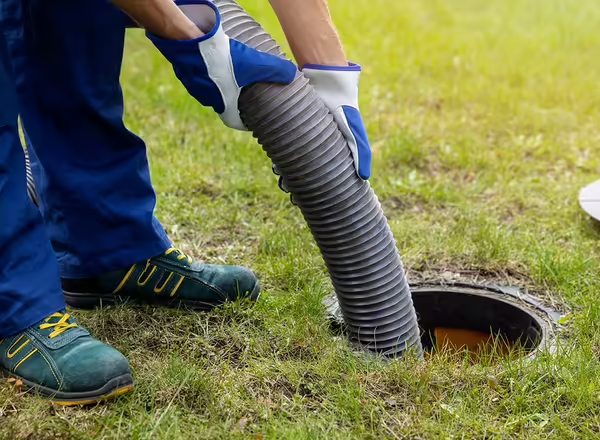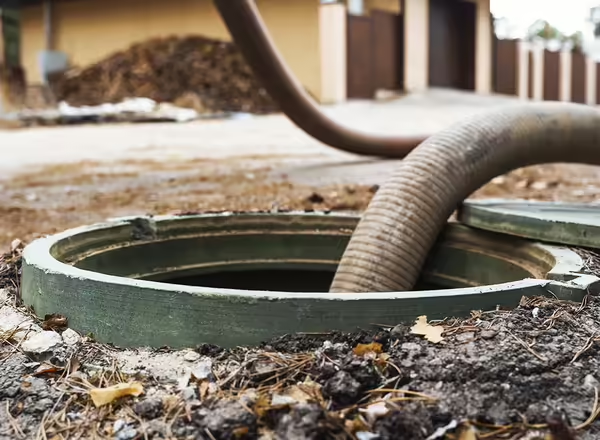How much water flows through your on-site system makes a big difference in how effectively the wastewater is treated. Overloading with large volumes of water may not allow enough time for solids to settle in standard systems, or to be treated properly in aerobic systems. Water use habits and fixtures also have an effect on how much water enters the system.
An on-site treatment system is not the same as a city sewer. You cannot just put anything down the drain. Certain materials may plug up the system, or stop the decomposition process.
- One of the most effective ways to reduce overloading is to replace older high use fixtures with more efficient ones. For example, new high efficiency washing machines often use less than 50% of the water that older machines use. This can amount up to 25 gallons per wash that is saved.
- Try to distribute laundry loads evenly over the week. Doing all the laundry on one day will overwhelm the system with large volumes of water.
- If chlorine is used in laundry, do not use any more than is absolutely necessary. Chlorine will kill beneficial bacteria in your system.
- If a garbage disposal is used, use it minimally. Using a garbage disposal with an on-site system adds huge amounts of organic materials that quickly fill up the tank. Tank cleaning should be done every year if this is used extensively.
- DO NOT pour grease down the drain. Oils and grease will build up on pipes, is resistant to decomposition, and will eventually plug up drainage lines.
- Non-degradable materials containing plastic, along with most paper products other than toilet tissue should not be flushed into the system. This includes tampons, disposable diapers, condoms, and paper towels. These items may block the flow of water at the inlet or outlet of the tank.
- Minimize the amount of cleaners that go down the drain. Many cleaners contain chemicals that kill beneficial bacteria in the tank.
- Have your tank pumped out every 1 to 3 years. This is a normal part of system maintenance, and will greatly extend the effective life of the drain field. Failure to pump out the tank will decrease the free space for wastewater in the tank, and will allow solids and grease to enter the drain field.
- If you have a water softener, recharge it as infrequently as possible, or use one that automatically recharges only after it has treated a certain amount of water.

Every homeowner that uses a septic system for wastewater treatment should clean his or her septic tank every one to three years. This type of maintenance must be done to remove scum and sludge that builds up in the tank. If this material builds up too much, it will plug up the drainage field lines, creating a very expensive problem.
Cleaning of the tank must be done by a licensed and bonded septic tank professional. All accumulated material, liquid and solid should be removed. This is accomplished by pumping and flushing between the tank and the pumping truck. The cleaning process breaks up scum and sludge, allowing solids and scum to be removed. Cleaning should take place through the manhole opening in the tank. If other openings are used, the tank will likely not be cleaned properly, and may damage baffles in the tank preventing solids from entering the drain field. Ask to have baffles in the tank inspected to make sure they are not damaged.
- Make sure the pumping contractor is licensed and bonded.
- When finished, the only thing remaining in the tank should be a black film on the walls and a small amount of liquid. Bacteria in the film and liquid will aid in restarting the decomposition process.
- After the pumping process is complete, ask the pumper to make sure baffles in the tank are in place and functioning properly.
- Septic systems should be cleaned every year in certain situations. Garbage disposals add a tremendous amount of solids into the system. More people living in the house than what the septic system was designed for is another situation making frequent tank cleaning essential.
- Aerobic wastewater systems have been installed in some home sites. These systems, while more efficient at decomposing solids, still must be periodically cleaned. No system can decompose all material than comes into the tank.
- Septic tanks function in an oxygen limited environment. Other gases, which can be deadly, are present in the tank. Disease pathogens are also present.
- When working around a functioning septic tank, or getting one ready to be pumped, the following precautions must be remembered.
- Do not go down into a septic tank. Gases such as hydrogen sulfide will cause immediate unconsciousness.
- Do not smoke near septic tank openings. Combustible gases may be present.
- Never use electrical tools or other appliances close to water or wet ground.
- If a strong sewer gas or rotten egg smell is present inside the house, evacuate the building and call a professional to correct the problem.
- After working on any part of the septic system, be sure to wash hands and clothes thoroughly. Change clothes before entering a home or other building.
- Sewage is very corrosive. Care must be taken around tank components.
- The safest way of having repairs or work performed is having a trained, licensed, and bonded professional do the work properly.

Starters
One line of products is called starters. These are supposed to add beneficial bacteria to a new system. They will not harm the system, but bacteria is added to the system every time a flush occurs, so it is not necessary to add more from a commercial source.
Supplying Nutrients
Some products are marketed as supplying nutrients to aid bacterial growth in septic systems. Everything the bacteria need is already present in the sewage- that is why they are there. When excessive amounts of cleaning products are used, such as chlorine bleach and anti-bacterial products, many bacteria are killed when introduced into the septic system. Reducing usage of these cleaners and disinfectants will allow bacteria activity in the system to resume by itself.
Enzyme & Degreaser Cleaners
Septic system cleaners are sold to clean the pipes and tank. If the product says it does this by enzymes, it is the same as a starter or nutrient supplier. If they act as a degreaser, they will disperse the layer of grease and oil naturally present in the septic tank. As these solids move into the drainfield, they will plug up the system, causing failure. Some of these products are powerful, and may also be dangerous to handle. These will not replace the need to have a tank periodically pumped out, which should be done every one to three years.